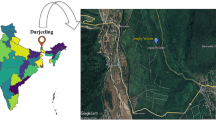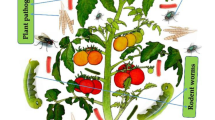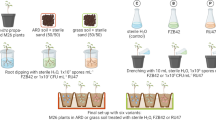Abstract
We studied the survival of four elite strains of Bradyrhizobium in liquid inoculants with three formulations with exopolysaccharides extracted from other rhizobia genera, and the symbiotic efficiency of these elite strains with soybean and cowpea in a greenhouse. For that purpose, we verified the effectiveness of formulations for maintaining the cell viability of strains by counting the colony-forming units (CFU) per milliliter of the liquid inoculants with formulations after 90 days. For survival of the soybean inoculant strains, 29W and CPAC15, the largest number of CFU (> 1010 mL−1) after 90 days was observed in the PEPS formulation. For the cowpea inoculant strains, INPA3-11B and UFLA3-84, the REPS1 formulation had the largest number of CFU (> 1010 mL−1) after 90 days. The symbiotic efficiency of the PEPS formulation, followed by REPS2, was higher than that shown by the commercial inoculant in soybean. For cowpea, the three formulations with EPS, especially REPS1, showed symbiotic efficiency better than that of the commercial inoculant.


Similar content being viewed by others
References
Albareda M, Rodríguez-Navarro DN, Camacho M, Temprano FJ (2008) Alternatives to peat as a carrier for rhizobia inoculants: solid and liquid formulations. Soil Biol Biochem 40:2771–2779. https://doi.org/10.1016/j.soilbio.2008.07.021
Araújo KS, de Carvalho F, Moreira FMDS (2017) Bukholderia strains promote Mimosa spp. growth but not Macroptilium atropurpureum. Rev Ciênc AGRONÔMICA. https://doi.org/10.5935/1806-6690.20170005
Bashan Y, de-Bashan LE, Prabhu SR, Hernandez J-P (2014) Advances in plant growth-promoting bacterial inoculant technology: formulations and practical perspectives (1998–2013). Plant Soil 378:1–33. https://doi.org/10.1007/s11104-013-1956-x
Bauer AW, Kirby WM, Sherris JC, Turck M (1966) Antibiotic susceptibility testing by a standardized single disk method. Am J Clin Pathol 45:493–496
Bomfeti CA, Florentino LA, Guimarães AP et al (2011) Exopolysaccharides produced by the symbiotic nitrogen-fixing bacteria of leguminosae. Rev Bras Ciênc Solo 35:657–671. https://doi.org/10.1590/S0100-06832011000300001
Castellane TCL, Macedo Lemos EG (2007) Composição de exopolissacarídeos produzidos por estirpes de rizóbios cultivados em diferentes fontes de carbono. Pesqui Agropecu Bras 42(10):1503–1506. https://doi.org/10.1590/S0100-204X2007001000019
Castellane TCL, Lemos MVF, Macedo Lemos EG (2014) Evaluation of the biotechnological potential of Rhizobium tropici strains for exopolysaccharide production. Carbohydr Polym 111:191–197. https://doi.org/10.1016/j.carbpol.2014.04.066
Castellane TCL, Persona MR, Campanharo JC, de Macedo Lemos EG (2015) Production of exopolysaccharide from rhizobia with potential biotechnological and bioremediation applications. Int J Biol Macromol 74:515–522. https://doi.org/10.1016/j.ijbiomac.2015.01.007
Chiluwal A, Haramoto ER, Hildebrand D et al (2021) Late-season nitrogen applications increase soybean yield and seed protein concentration. Front Plant Sci 12:715940. https://doi.org/10.3389/fpls.2021.715940
Cieśla J, Kopycińska M, Łukowska M et al (2016) Surface properties of wild-type Rhizobium leguminosarum bv. trifolii strain 24.2 and its derivatives with different extracellular polysaccharide content. PLoS ONE 11:e0165080. https://doi.org/10.1371/journal.pone.0165080
Cochran WG (1950) Estimation of bacterial densities by means of the “most probable number.” Int Biom Soc 6:105–116
Donot F, Fontana A, Baccou JC, Schorr-Galindo S (2012) Microbial exopolysaccharides: main examples of synthesis, excretion, genetics and extraction. Carbohydr Polym 87:951–962. https://doi.org/10.1016/j.carbpol.2011.08.083
dos Santos HG (2018) Sistema brasileiro de classificação de solos, 5a̲ edição revista e ampliada. Embrapa, Brasília, DF
Farias TP, Trochmann A, Soares BL, Moreira FMS (2016) Rhizobia inoculation and liming increase cowpea productivity in Maranhão State. Acta Sci Agron 38:387. https://doi.org/10.4025/actasciagron.v38i3.28630
Ferreira DF (2019) Sisvar: a computer analysis system to fixed effects split plot type designs. Rev Bras Biom 37:529. https://doi.org/10.28951/rbb.v37i4.450
Flemming H-C, Wingender J (2010) The biofilm matrix. Nat Rev Microbiol 8:623–633. https://doi.org/10.1038/nrmicro2415
Fred E, Waksman S (1928) Laboratory manual of general microbiology with special reference to the microorganisms of the soil. McGraw-Hill Book, New York
Graham PH, Draeger KJ, Ferrey ML et al (1994) Acid pH tolerance in strains of Rhizobium and Bradyrhizobium, and initial studies on the basis for acid tolerance of Rhizobium tropici UMR1899. Can J Microbiol 40:198–207. https://doi.org/10.1139/m94-033
Hoagland DR, Arnon DI (1950) The water-culture method for growing plants without soil. Calif Agric Exp Stn 347:32
Kawaharada Y, Kelly S, Nielsen MW et al (2015) Receptor-mediated exopolysaccharide perception controls bacterial infection. Nature 523:308–312. https://doi.org/10.1038/nature14611
Lacerda AM, Moreira FMDS, Andrade MJB, Soares ALDL (2004) Efeito de estirpes de rizóbio sobre a nodulação e produtividade do feijão-caupi. Rev Ceres 51:67–82
Lee S-K, Lur H-S, Lo K-J et al (2016) Evaluation of the effects of different liquid inoculant formulations on the survival and plant-growth-promoting efficiency of Rhodopseudomonas palustris strain PS3. Appl Microbiol Biotechnol 100:7977–7987. https://doi.org/10.1007/s00253-016-7582-9
Li S, Shah NP (2014) Antioxidant and antibacterial activities of sulphated polysaccharides from Pleurotus eryngii and Streptococcus thermophilus ASCC 1275. Food Chem 165:262–270. https://doi.org/10.1016/j.foodchem.2014.05.110
Malavolta E (1980) Elementos de nutrição mineral de plantas, 1st edn. Agronômica Ceres
Peres JRR, Vidor C (1980) Seleção de estirpes de Rhizobium japonicum e competitividade por sítios de infecção nodular em cultivares de soja (Glycine max (L.) MERRIL). Agron Sulriograndene 16:205–219
Peres JRR, Mendes I, Suhet A, Vargas MAT (1993) Eficiência e competitividade de estirpes de rizóbio para soja em solos de cerrado. Rev Bras Ciênc Solo 17:357–363
Rangel WDM, de Oliveira Longatti SM, Ferreira PAA et al (2017) Leguminosae native nodulating bacteria from a gold mine As-contaminated soil: multi-resistance to trace elements, and possible role in plant growth and mineral nutrition. Int J Phytoremediat 19:925–936. https://doi.org/10.1080/15226514.2017.1303812
Saharan K, Sarma MVRK, Prakash A et al (2011) Shelf-life enhancement of bio-inoculant formulation by optimizing the trace metals ions in the culture médium for production of DAPG using fluorescente pseudomonad R62. Enzyme Microb Technol 48:33–38. https://doi.org/10.1016/j.enzmictec.2010.09.002
Sehrawat A, Yadav A, Anand RC et al (2017) Enhancement of shelf life of liquid biofertilizer containing Rhizobium sp. infecting mungbean (Vigna radiata L.). Legume Res Int J. https://doi.org/10.18805/lr.v0i0.7648
Stephens JHG, Rask HM (2000) Inoculant production and formulation. Field Crops Res 65:249–258. https://doi.org/10.1016/S0378-4290(99)00090-8
Sutherland IW (2001) Microbial polysaccharides from Gram-negative bacteria. Int Dairy J 11:663–674. https://doi.org/10.1016/S0958-6946(01)00112-1
Tittabutr P, Payakapong W, Teaumroong N et al (2007) Growth, survival and field performance of bradyrhizobial liquid inoculant formulations with polymeric additives. ScienceAsia 33:069. https://doi.org/10.2306/scienceasia1513-1874.2007.33.069
Vincent JM (1970) A manual for the practical study of root-nodule bacteria, 15th edn. International Biological Programme, Blackwell Scientific, Oxford
Zhang J, Cao Y, Wang J et al (2016) Physicochemical characteristics and bioactivities of the exopolysaccharide and its sulphated polymer from Streptococcus thermophilus GST-6. Carbohydr Polym 146:368–375. https://doi.org/10.1016/j.carbpol.2016.03.063
Funding
We wish to thank the Programa de Bolsa de Incentivo à Qualificação dos Servidores do Instituto Federal de Educação, Ciência e Tecnologia do Maranhão (IFMA) for granting a doctoral scholarship to the first author; we are thankful for financial support from the Coordenação de Aperfeiçoamento de Pessoal de Nível Superior (CAPES) (CAPES/PROEX AUXPE 593/2018), to the Conselho Nacional de Desenvolvimento Científico e Tecnológico (CNPq) (304527/2016-5, 431504/2016-4), for the research productivity scholarship and grant to the corresponding author, and to the Fundação de Amparo à Pesquisa de Minas Gerais (FAPEMIG) for financial support.
Author information
Authors and Affiliations
Contributions
TPF, BLS, FMSM: conceived of study, performed research, analyzed data and wrote the paper. CSBD helped in performing research.
Corresponding author
Ethics declarations
Conflict of interest
The authors declare that they do not have conflicts of interest.
Research involving human and animal participants
This article does not involve studies with human or animal participants.
Additional information
Communicated by Jorge Membrillo-Hernández.
Publisher's Note
Springer Nature remains neutral with regard to jurisdictional claims in published maps and institutional affiliations.
Rights and permissions
About this article
Cite this article
Palhares Farias, T., Lima Soares, B., Barbosa D’Eça, C.S. et al. Polymeric formulations of liquid inoculants with rhizobia exopolysaccharides increase the survival and symbiotic efficiency of elite Bradyrhizobium strains. Arch Microbiol 204, 177 (2022). https://doi.org/10.1007/s00203-022-02779-z
Received:
Revised:
Accepted:
Published:
DOI: https://doi.org/10.1007/s00203-022-02779-z




